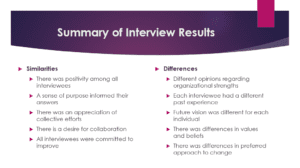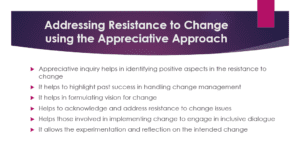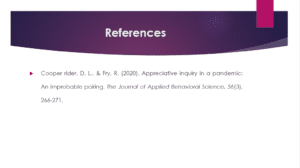Appreciative Inquiry Interview
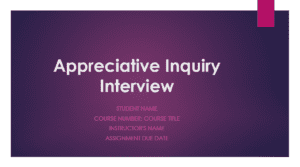
Based on the interview I did with five people selected randomly from the University, I was able to identify various similarities and differences among the interviewees. Regarding similarities, the interview participants exhibited a sense of positivity in achieving their dreams. Further, they exhibited a sense of purpose and drive towards achieving their desired dreams. Further, all the interviewees believed working collaboratively is better for an organization seeking success. As a result, they desired collaboration in all their endeavors. Lastly, the interviewees were committed to improving and becoming better in all they do. However, they exhibited notable differences that are worth highlighting. The interviewees had varying opinions regarding the organization’s strengths and different past experiences. Their vision for the future was also different, shaped by their different values and beliefs. Lastly, they had differences in their preferred approaches to change. We offer unique help on interview assignments.
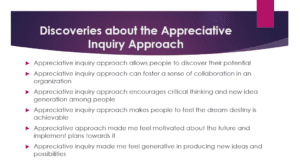
The appreciative inquiry approach can be used to address resistance to change in various ways. First, it can help identify positive aspects of the resistance to change. Second, it helps to highlight past success in handling change management (Cooperrider & Fry, 2020). Third, it helps in formulating a vision for the intended change. Fourth, the appreciative inquiry approach helps to acknowledge and address resistance to change issues. Fifth, it helps those involved in implementing change as a measure to engage in inclusive dialogue. Lastly, it allows us to experiment and reflect on the planned change.
ORDER A PLAGIARISM-FREE PAPER HERE
We’ll write everything from scratch
Question

Appreciative Inquiry Interview
Step 1: Refer to the multimedia section this week and review “How to Do An Appreciative Inquiry Interview.” Then, interview five people within your organization (use a university for the organization) using the AI technique.
Step 2: Summarize and synthesize the interview results. What are the themes (i.e., the similarities and differences in the interviews)? What did you notice about the appreciative approach? In other words, how did the other person feel, and what did you feel?
Step 3: How might you use an Appreciative Inquiry approach to understand better and transform the resistance to change?
Formatting
• Length: Your presentation should comprise 3-5 slides with accompanying speaker notes. Points will be deducted for submissions that exceed the specified length (see the rubric below for more details).
• Adapted APA: Please adhere to the formatting and citations.

